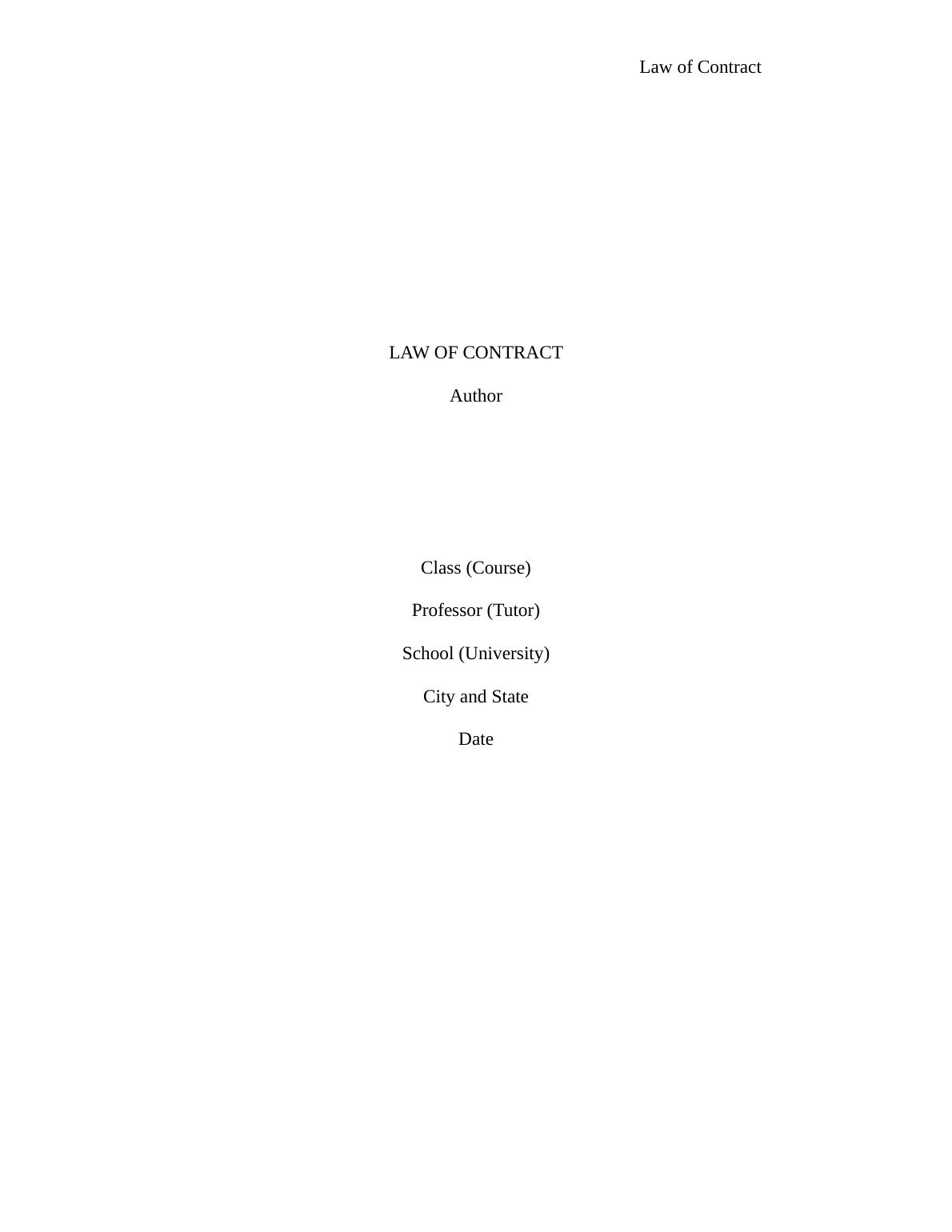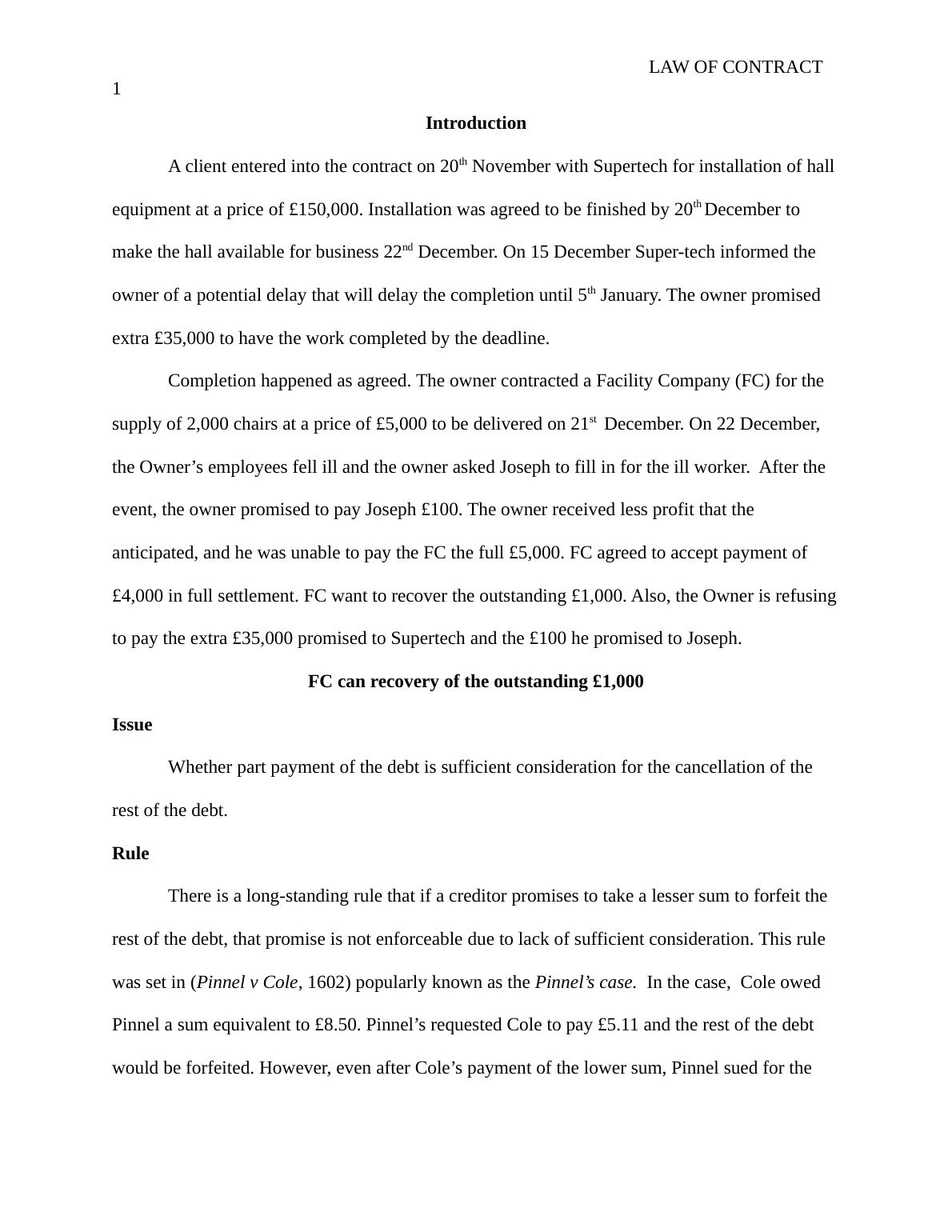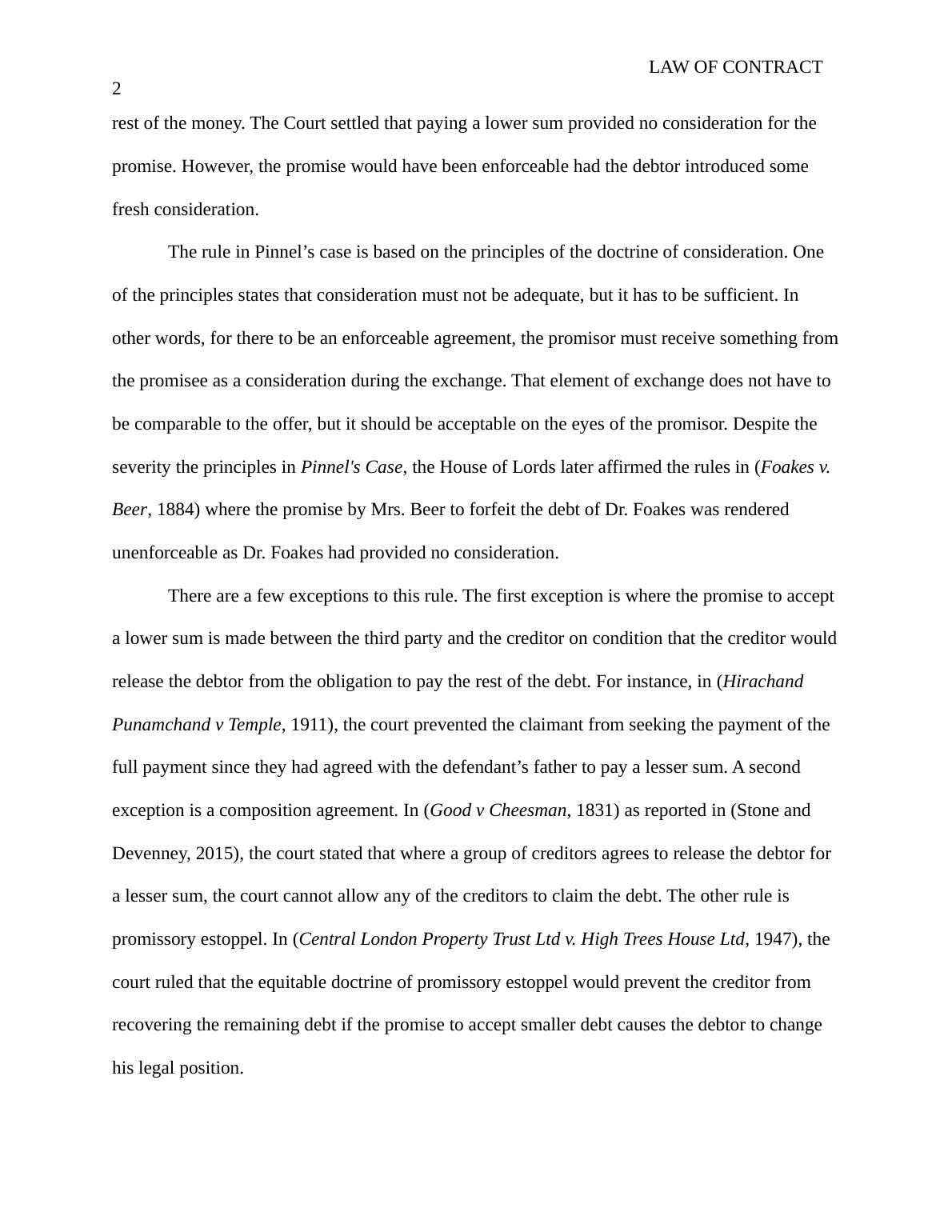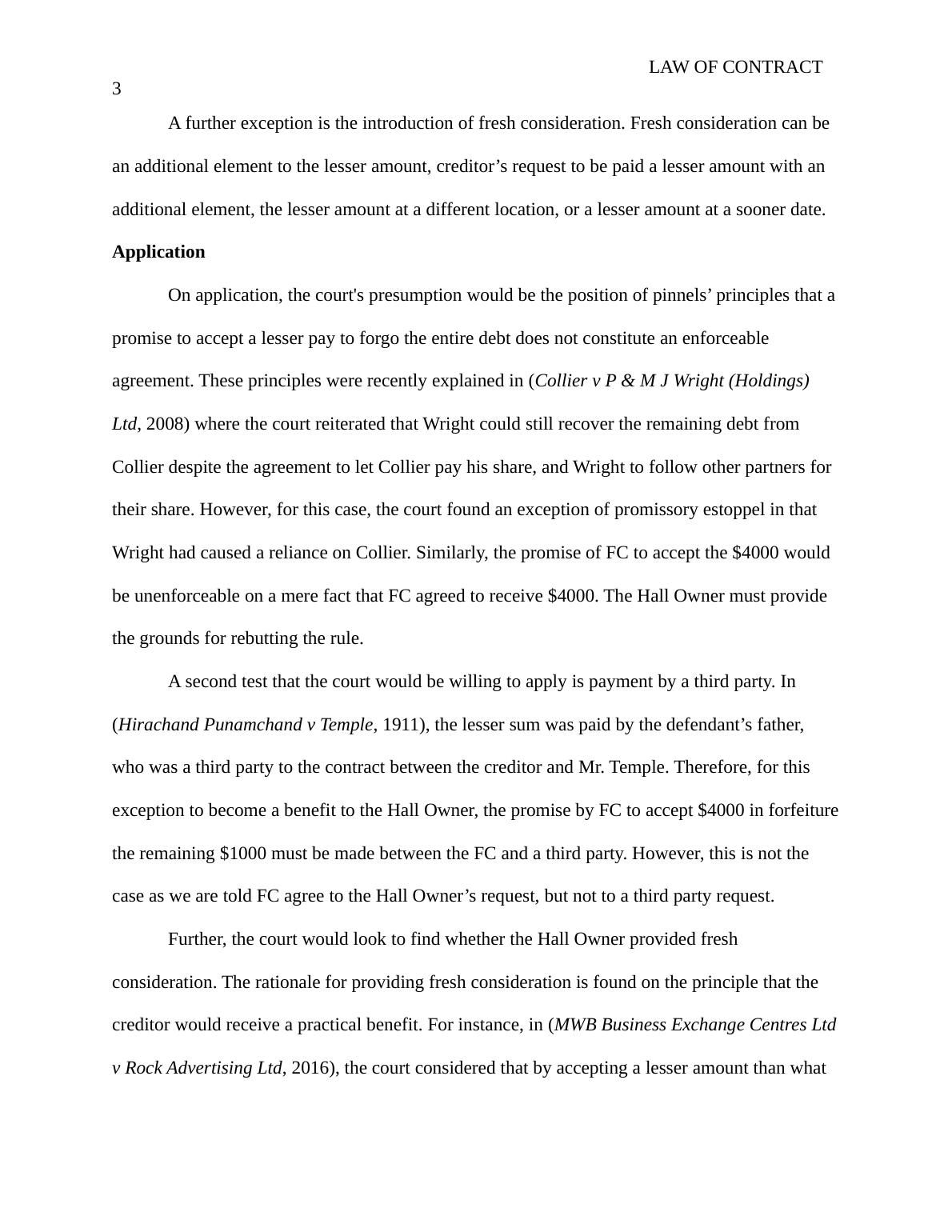Law of Contract: Consideration and Enforceable Agreements
Added on 2023-01-19
13 Pages4110 Words41 Views
Law of Contract
LAW OF CONTRACT
Author
Class (Course)
Professor (Tutor)
School (University)
City and State
Date
LAW OF CONTRACT
Author
Class (Course)
Professor (Tutor)
School (University)
City and State
Date

LAW OF CONTRACT
1
Introduction
A client entered into the contract on 20th November with Supertech for installation of hall
equipment at a price of £150,000. Installation was agreed to be finished by 20th December to
make the hall available for business 22nd December. On 15 December Super-tech informed the
owner of a potential delay that will delay the completion until 5th January. The owner promised
extra £35,000 to have the work completed by the deadline.
Completion happened as agreed. The owner contracted a Facility Company (FC) for the
supply of 2,000 chairs at a price of £5,000 to be delivered on 21st December. On 22 December,
the Owner’s employees fell ill and the owner asked Joseph to fill in for the ill worker. After the
event, the owner promised to pay Joseph £100. The owner received less profit that the
anticipated, and he was unable to pay the FC the full £5,000. FC agreed to accept payment of
£4,000 in full settlement. FC want to recover the outstanding £1,000. Also, the Owner is refusing
to pay the extra £35,000 promised to Supertech and the £100 he promised to Joseph.
FC can recovery of the outstanding £1,000
Issue
Whether part payment of the debt is sufficient consideration for the cancellation of the
rest of the debt.
Rule
There is a long-standing rule that if a creditor promises to take a lesser sum to forfeit the
rest of the debt, that promise is not enforceable due to lack of sufficient consideration. This rule
was set in (Pinnel v Cole, 1602) popularly known as the Pinnel’s case. In the case, Cole owed
Pinnel a sum equivalent to £8.50. Pinnel’s requested Cole to pay £5.11 and the rest of the debt
would be forfeited. However, even after Cole’s payment of the lower sum, Pinnel sued for the
1
Introduction
A client entered into the contract on 20th November with Supertech for installation of hall
equipment at a price of £150,000. Installation was agreed to be finished by 20th December to
make the hall available for business 22nd December. On 15 December Super-tech informed the
owner of a potential delay that will delay the completion until 5th January. The owner promised
extra £35,000 to have the work completed by the deadline.
Completion happened as agreed. The owner contracted a Facility Company (FC) for the
supply of 2,000 chairs at a price of £5,000 to be delivered on 21st December. On 22 December,
the Owner’s employees fell ill and the owner asked Joseph to fill in for the ill worker. After the
event, the owner promised to pay Joseph £100. The owner received less profit that the
anticipated, and he was unable to pay the FC the full £5,000. FC agreed to accept payment of
£4,000 in full settlement. FC want to recover the outstanding £1,000. Also, the Owner is refusing
to pay the extra £35,000 promised to Supertech and the £100 he promised to Joseph.
FC can recovery of the outstanding £1,000
Issue
Whether part payment of the debt is sufficient consideration for the cancellation of the
rest of the debt.
Rule
There is a long-standing rule that if a creditor promises to take a lesser sum to forfeit the
rest of the debt, that promise is not enforceable due to lack of sufficient consideration. This rule
was set in (Pinnel v Cole, 1602) popularly known as the Pinnel’s case. In the case, Cole owed
Pinnel a sum equivalent to £8.50. Pinnel’s requested Cole to pay £5.11 and the rest of the debt
would be forfeited. However, even after Cole’s payment of the lower sum, Pinnel sued for the

LAW OF CONTRACT
2
rest of the money. The Court settled that paying a lower sum provided no consideration for the
promise. However, the promise would have been enforceable had the debtor introduced some
fresh consideration.
The rule in Pinnel’s case is based on the principles of the doctrine of consideration. One
of the principles states that consideration must not be adequate, but it has to be sufficient. In
other words, for there to be an enforceable agreement, the promisor must receive something from
the promisee as a consideration during the exchange. That element of exchange does not have to
be comparable to the offer, but it should be acceptable on the eyes of the promisor. Despite the
severity the principles in Pinnel's Case, the House of Lords later affirmed the rules in (Foakes v.
Beer, 1884) where the promise by Mrs. Beer to forfeit the debt of Dr. Foakes was rendered
unenforceable as Dr. Foakes had provided no consideration.
There are a few exceptions to this rule. The first exception is where the promise to accept
a lower sum is made between the third party and the creditor on condition that the creditor would
release the debtor from the obligation to pay the rest of the debt. For instance, in (Hirachand
Punamchand v Temple, 1911), the court prevented the claimant from seeking the payment of the
full payment since they had agreed with the defendant’s father to pay a lesser sum. A second
exception is a composition agreement. In (Good v Cheesman, 1831) as reported in (Stone and
Devenney, 2015), the court stated that where a group of creditors agrees to release the debtor for
a lesser sum, the court cannot allow any of the creditors to claim the debt. The other rule is
promissory estoppel. In (Central London Property Trust Ltd v. High Trees House Ltd, 1947), the
court ruled that the equitable doctrine of promissory estoppel would prevent the creditor from
recovering the remaining debt if the promise to accept smaller debt causes the debtor to change
his legal position.
2
rest of the money. The Court settled that paying a lower sum provided no consideration for the
promise. However, the promise would have been enforceable had the debtor introduced some
fresh consideration.
The rule in Pinnel’s case is based on the principles of the doctrine of consideration. One
of the principles states that consideration must not be adequate, but it has to be sufficient. In
other words, for there to be an enforceable agreement, the promisor must receive something from
the promisee as a consideration during the exchange. That element of exchange does not have to
be comparable to the offer, but it should be acceptable on the eyes of the promisor. Despite the
severity the principles in Pinnel's Case, the House of Lords later affirmed the rules in (Foakes v.
Beer, 1884) where the promise by Mrs. Beer to forfeit the debt of Dr. Foakes was rendered
unenforceable as Dr. Foakes had provided no consideration.
There are a few exceptions to this rule. The first exception is where the promise to accept
a lower sum is made between the third party and the creditor on condition that the creditor would
release the debtor from the obligation to pay the rest of the debt. For instance, in (Hirachand
Punamchand v Temple, 1911), the court prevented the claimant from seeking the payment of the
full payment since they had agreed with the defendant’s father to pay a lesser sum. A second
exception is a composition agreement. In (Good v Cheesman, 1831) as reported in (Stone and
Devenney, 2015), the court stated that where a group of creditors agrees to release the debtor for
a lesser sum, the court cannot allow any of the creditors to claim the debt. The other rule is
promissory estoppel. In (Central London Property Trust Ltd v. High Trees House Ltd, 1947), the
court ruled that the equitable doctrine of promissory estoppel would prevent the creditor from
recovering the remaining debt if the promise to accept smaller debt causes the debtor to change
his legal position.

LAW OF CONTRACT
3
A further exception is the introduction of fresh consideration. Fresh consideration can be
an additional element to the lesser amount, creditor’s request to be paid a lesser amount with an
additional element, the lesser amount at a different location, or a lesser amount at a sooner date.
Application
On application, the court's presumption would be the position of pinnels’ principles that a
promise to accept a lesser pay to forgo the entire debt does not constitute an enforceable
agreement. These principles were recently explained in (Collier v P & M J Wright (Holdings)
Ltd, 2008) where the court reiterated that Wright could still recover the remaining debt from
Collier despite the agreement to let Collier pay his share, and Wright to follow other partners for
their share. However, for this case, the court found an exception of promissory estoppel in that
Wright had caused a reliance on Collier. Similarly, the promise of FC to accept the $4000 would
be unenforceable on a mere fact that FC agreed to receive $4000. The Hall Owner must provide
the grounds for rebutting the rule.
A second test that the court would be willing to apply is payment by a third party. In
(Hirachand Punamchand v Temple, 1911), the lesser sum was paid by the defendant’s father,
who was a third party to the contract between the creditor and Mr. Temple. Therefore, for this
exception to become a benefit to the Hall Owner, the promise by FC to accept $4000 in forfeiture
the remaining $1000 must be made between the FC and a third party. However, this is not the
case as we are told FC agree to the Hall Owner’s request, but not to a third party request.
Further, the court would look to find whether the Hall Owner provided fresh
consideration. The rationale for providing fresh consideration is found on the principle that the
creditor would receive a practical benefit. For instance, in (MWB Business Exchange Centres Ltd
v Rock Advertising Ltd, 2016), the court considered that by accepting a lesser amount than what
3
A further exception is the introduction of fresh consideration. Fresh consideration can be
an additional element to the lesser amount, creditor’s request to be paid a lesser amount with an
additional element, the lesser amount at a different location, or a lesser amount at a sooner date.
Application
On application, the court's presumption would be the position of pinnels’ principles that a
promise to accept a lesser pay to forgo the entire debt does not constitute an enforceable
agreement. These principles were recently explained in (Collier v P & M J Wright (Holdings)
Ltd, 2008) where the court reiterated that Wright could still recover the remaining debt from
Collier despite the agreement to let Collier pay his share, and Wright to follow other partners for
their share. However, for this case, the court found an exception of promissory estoppel in that
Wright had caused a reliance on Collier. Similarly, the promise of FC to accept the $4000 would
be unenforceable on a mere fact that FC agreed to receive $4000. The Hall Owner must provide
the grounds for rebutting the rule.
A second test that the court would be willing to apply is payment by a third party. In
(Hirachand Punamchand v Temple, 1911), the lesser sum was paid by the defendant’s father,
who was a third party to the contract between the creditor and Mr. Temple. Therefore, for this
exception to become a benefit to the Hall Owner, the promise by FC to accept $4000 in forfeiture
the remaining $1000 must be made between the FC and a third party. However, this is not the
case as we are told FC agree to the Hall Owner’s request, but not to a third party request.
Further, the court would look to find whether the Hall Owner provided fresh
consideration. The rationale for providing fresh consideration is found on the principle that the
creditor would receive a practical benefit. For instance, in (MWB Business Exchange Centres Ltd
v Rock Advertising Ltd, 2016), the court considered that by accepting a lesser amount than what

End of preview
Want to access all the pages? Upload your documents or become a member.
Related Documents
Gratuitous Promises for Reducing Debt - Commercial Lawlg...
|5
|1192
|110
Application of Pinnel's rule and capacity to contract in two contract law caseslg...
|7
|2230
|262
Business and contract Law - Assignmentlg...
|9
|1380
|141
